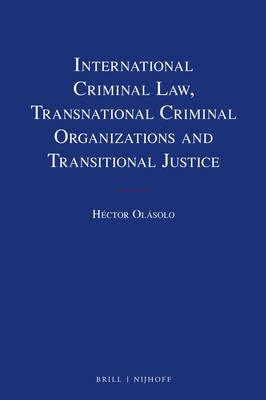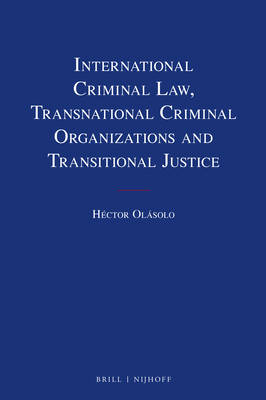
- Afhalen na 1 uur in een winkel met voorraad
- Gratis thuislevering in België vanaf € 30
- Ruim aanbod met 7 miljoen producten
- Afhalen na 1 uur in een winkel met voorraad
- Gratis thuislevering in België vanaf € 30
- Ruim aanbod met 7 miljoen producten
Zoeken
International Criminal Law, Transnational Criminal Organizations and Transitional Justice
Héctor Olásolo
Hardcover | Engels
€ 293,45
+ 586 punten
Omschrijving
Parties negotiating the end of authoritarian regimes or armed conflicts are almost inevitably left in a situation of legal uncertainty. Despite their overlapping scope of application, the differences between the approaches of International Criminal Law (ICL) and Transitional Justice (TJ) are so profound that, unless dogmatisms are left aside and a process of dialogue is entered into, it will not be possible to harmonize the current legal regime of international crimes with the need to articulate transitional processes that are capable of effectively overcoming authoritarian regimes and armed conflicts. The serious material limitations shown by national, international and hybrid ICL enforcement mechanisms should be acknowledged and the goals pursued by ICL should be redefined accordingly. A minimum level of consensus on the scope of application, goals and elements of TJ should also be reached. Situations of systematic or large scale violence against the civilian population by transnational criminal organizations increase the challenge.
Specificaties
Betrokkenen
- Auteur(s):
- Uitgeverij:
Inhoud
- Aantal bladzijden:
- 252
- Taal:
- Engels
Eigenschappen
- Productcode (EAN):
- 9789004340992
- Verschijningsdatum:
- 16/08/2018
- Uitvoering:
- Hardcover
- Formaat:
- Genaaid
- Afmetingen:
- 160 mm x 239 mm
- Gewicht:
- 498 g

Alleen bij Standaard Boekhandel
+ 586 punten op je klantenkaart van Standaard Boekhandel
Beoordelingen
We publiceren alleen reviews die voldoen aan de voorwaarden voor reviews. Bekijk onze voorwaarden voor reviews.








